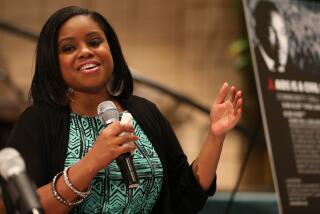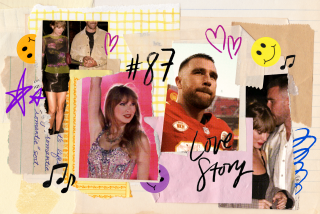Burdett’s Candor Makes Tap-Dance Unnecessary
- Share via
I remember the waiter standing at our table, pad and pencil poised, just as Steve Burdett was breaking the ice.
“First of all,” Burdett said with only the hint of a shrug, “I’m gay.”
I turned to our server: “We’ll need a couple of minutes.”
Frankly, I was floored by Burdett’s candor. I considered this a sensitive subject. And I had entered the interview uneasily, knowing the conversation would focus on a man’s sexual orientation--uncharted territory, as far as my reporting experience was concerned.
Burdett wasn’t trying to shock anyone; he was just being himself. But that was something new to him. Just as this story was new to me.
In an open letter in the Saugus Speedway racing program in August, Burdett, a 30-year-old driver in the track’s Sportsman division, had revealed that he had tested positive for HIV, the virus that causes AIDS. And although it was not mentioned in the letter, Burdett had begun to admit to his racing competitors that he is homosexual.
Burdett desperately wanted to tell his story. And I was eager to listen. This was a belt-high fastball of a story and I wanted to knock it out of the park.
When I spotted Burdett’s letter, I recalled a conversation at a staff meeting months earlier in which we discussed the prospect of one day encountering this kind of story: a homosexual athlete trapped in the macho world of sports. Should he stand up and be accepted for who he is or remain huddled in secrecy?
But unlike the numerous stories we write about high school quarterbacks who can fling a football 60 yards, this one would require a soft touch, a bit of tap-dancing around sensitive subject matter. Or so I thought.
What I will remember most about Burdett--even more than his courage--is his refreshingly forthright attitude. In this business, getting a source to speak candidly, especially about personal matters, can be about as easy as pulling a molar.
Preparing for the interview, worrying about how I might phrase certain questions, I completely missed Burdett’s point: Be honest and straightforward. He wanted me to tell it like it is.
Burdett casually sipped cold beer from a bottle as he recounted how he believed he had contracted the virus, how he had feared going public with his homosexuality and how his life had changed in the 2 1/2 years since he first became ill. Burdett does not have AIDS but he often is fatigued by the virus.
“It’s OK,” he said. “I am who I am. I’m not going to continue my life pretending I’m someone I’m not.”
For most of his life, Burdett could not admit to himself that he was gay. And no one had reason to suspect that he was. He worked as a mechanic and drove a fast car. “Being a race-car driver,” he said, “was a good cover.”
All that began to change when he contracted the HIV virus. He slowly came to terms with his sexual identity. But that was only part of it.
When rumors about Burdett began to swirl, he was faced with a challenge. The racing world is “pretty much made up of a bunch of rednecks,” said Pat Mintey Jr., one of Burdett’s friends and competitors. Burdett, the son of a race-car driver, knew that all too well. He wasn’t about to confide in his peers.
Yet the weight on his shoulders was enormous.
Burdett became so depressed he began to take evening drives to the beach, where he would stand atop a cliff and contemplate jumping.
“No one would miss me,” he would say softly to himself. What made him want to live?
“I asked myself, ‘What do I want to do with the rest of my life?’ ” Burdett said. “And I decided the biggest thing I could do is stand up and come forward. Let’s get rid of the hiding from (AIDS), the it-can’t-happen-to-me attitude. All that is what’s causing this epidemic to spread. I’m not trying to be a celebrity. I just think that (promoting) openness is the right thing to do.”
For that, I admired Burdett, and I told him so. I also thanked him for making my job easier.
The reporting and writing went more smoothly than I could have imagined. And I basked in compliments when the story was reprinted in the Times’ Washington, D.C., edition.
But my satisfaction was nothing compared to Burdett’s.
His phone began to ring. Another publication wanted his story. A local news station featured him during its nightly newscast. Mail poured in.
Burdett phoned me to offer his appreciation. “Gee, I’m on the front page,” he said. “Wait till my family sees this.”
He sounded like a kid about to dash home with the best report card of his life. He didn’t have to carry that burden any longer.
More to Read
Go beyond the scoreboard
Get the latest on L.A.'s teams in the daily Sports Report newsletter.
You may occasionally receive promotional content from the Los Angeles Times.










